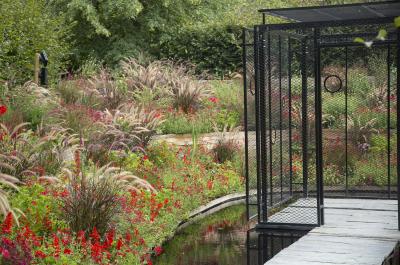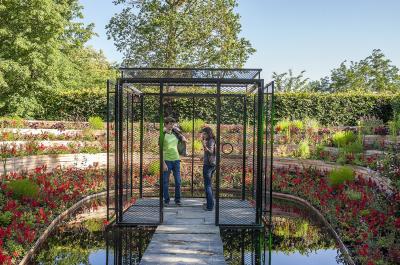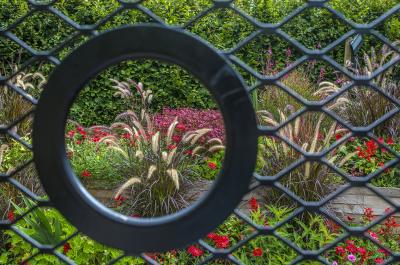An anthem to temptation! Is this garden seeking to defy the laws of desire and frustration? Abundance, profusion, luxurious excess – everything about it sparks our most wanton lusts. In its generosity, freely given and flamboyant, the setting overflows with flowers, plants and fruits each more seductive than the other. Delights, thousands of radiant delights, scarlet and crimson symbols of desire and passion. But not to be touched – such abundance, such dreams, are for the eyes alone.
A metal framework keeps us at a distance from the garden. Rifts are cut into the barrier and we should like to believe that they would let us through to lay hands upon the treasure, but such good fortune is not to be – the openings are too narrow and forbid entry once and for all. The temptations of Eden remain out of reach.
Passing madness, dementia, psychosis – so near to pleasure but so far away… And what if the framework were to close in around the visitor, imprisoning him, a cage in waiting?! A cruel inversion of the principle, with those tempting delights set free and the onlooker incarcerated! Frustration magnifies desire but leaves us paralysed, that same unslaked desire stirred by the countless shop-windows and seductive images that fill our daily lives.
DESIGNERS
ATELIER RURALTACTIKS -Nicolas EPAILLARD and Benjamin JARDEL, architects- and YOHIMBE PAYSAGISTE -Julien MASSÉ, landscape architect-
FRANCE

From left to right: Nicolas Epaillard, Julien Massé and Benjamin Jardel
Benjamin Jardel and Nicolas Epaillard set up the RuralTACTIKS architectural studio in 2009. They combine their skills in the field, honed by wide experience across the world, to create their own style of architecture, which reflects the requirements of bioclimatism, sustainability and respect for the human, social and landscape environments for which it is intended.
Yohimbé was founded in 2008 by Julien Massé, who puts his love of the profession and of nature at the service of those who live in the Rennes Basin, carrying out small tailor-made projects providing balance to gardens designed as extensions of buildings, using wood, stone, water and plants to create 5-dimensional tableaus.




